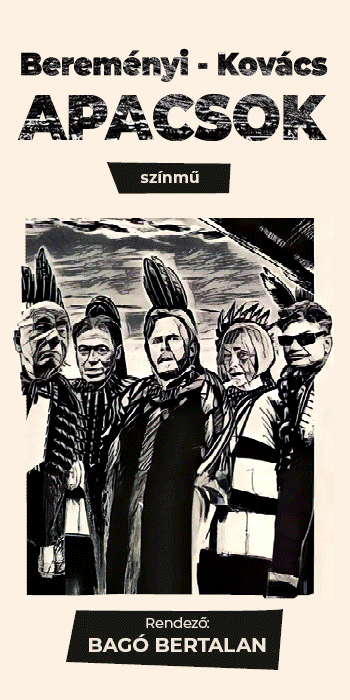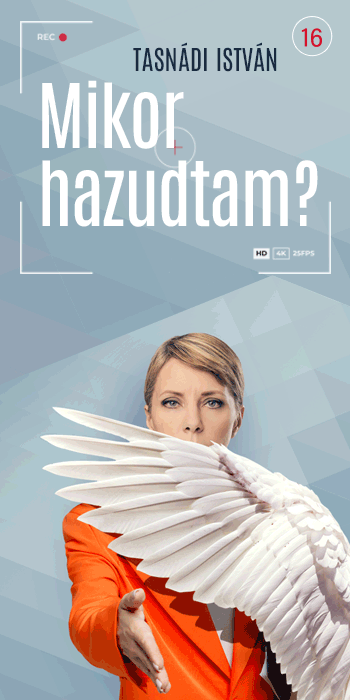LEVÉLTELEN ÁG A sógun / Disney+
A James Clawell regényét adaptáló új sorozat kétségkívül imponáló alkotás, s méghozzá olyannyira az, hogy e sorok írója szinte hajlamos lenne „nyolcszoros kerítés” mögé rejteni kisebb-nagyobb fenntartásait. LÁSZLÓ FERENC KRITIKÁJA.
MEGÉLT ÉS MEGÉRTETT HAGYOMÁNY Uitz Béla és az orosz ikon. Avantgárd / Kassák Múzeum
Uitz Béla Kassák Lajos sógora. Uitz Béla, a festőművész. Uitz Béla, a kommunista. Uitz Béla sokféle címkét kaphatott volna élete során, bár legkevésbé se bekategorizálható figurája a magyar képzőművészet történetének. Uitz Béla és jelenleg a Kassák Múzeumban látható festményei a megértésről és túlélésről, a múlthoz való kapcsolódásról mesélnek. SOMOGYI ROHONCZY
EGY KICSIT MÉG ÉRTELMETLENEBB HALÁL Arthur Miller: Az ügynök halála / Centrál Színház
Míg Arthur Miller eredetijében a múlt számtalan szellemképe kínozza Willy Lomant, addig a Centrál Színházban látható, Alföldi Róbert által rendezett Az ügynök halála elsősorban a jelenre koncentrál, bezárva a távlatokat egy nyomasztó nappaliba, ami az ügynök halála után csak szebb lesz, mint életében volt. KISS LÓRÁNT KRITIKÁJA.
JÁTSSZUNK OTT, AHOL NEM SZOKTUNK Gimesi Dóra: Rózsa és Ibolya / Vaskakas Bábszínház
Tündérországot és az emberek földjét távoli helyeknek gondolnánk, pedig átjárható a határ, még ha veszélyes is. Csak oda kell nézni, ahova ritkán szoktunk. A győri Vaskakas Bábszínház bemutatta Gimesi Dóra Rózsa és Ibolya című népmese-adaptációját Tengely Gábor rendezésében. NAGY MIHÁLY KRITIKÁJA.
A „SZAKMA” ÉS/VAGY A „SZENT IHLET” Paavo Järvi és a Budapesti Fesztiválzenekar: Tüür, Schumann, Sibelius / Müpa Budapest
Ars és tekhné – művészet és mesterség –, tanultuk rég az iskolában a fogalmakat. Mikor választhatók szét, és mikor nem? A kérdést ritkán veti fel hangverseny olyan élesen, ahogyan Paavo Järvi és a Budapesti Fesztiválzenekar koncertje tette. Csengery Kristóf kritikája.
ARCANUM – TÖBB, MINT ADATBÁZIS Beszélgetés Biszak Sándorral, az Arcanum alapítójával
Havi egymillió oldalt scannelnek be az Arcanum Adatbázis Kiadó elkötelezett munkatársai. A szám elképesztő, de minket régóta érdekel, hogy cikkeink-videóink elengedhetetlen, láthatatlan munkatársának valójában hogyan zajlanak a hétköznapjai. Biszak Sándorral, az Arcanum alapítójával beszélgetett Jászay Tamás, lapunk főszerkesztője.
Hirdetés
JÁTSSZUNK OTT, AHOL NEM SZOKTUNK Gimesi Dóra: Rózsa és Ibolya / Vaskakas Bábszínház
Tündérországot és az emberek földjét távoli helyeknek gondolnánk, pedig átjárható a határ, még ha veszélyes is. Csak oda kell nézni, ahova ritkán szoktunk. A győri Vaskakas Bábszínház bemutatta Gimesi Dóra Rózsa és Ibolya című népmese-adaptációját Tengely Gábor rendezésében. NAGY MIHÁLY KRITIKÁJA.
A „SZAKMA” ÉS/VAGY A „SZENT IHLET” Paavo Järvi és a Budapesti Fesztiválzenekar: Tüür, Schumann, Sibelius / Müpa Budapest
Ars és tekhné – művészet és mesterség –, tanultuk rég az iskolában a fogalmakat. Mikor választhatók szét, és mikor nem? A kérdést ritkán veti fel hangverseny olyan élesen, ahogyan Paavo Järvi és a Budapesti Fesztiválzenekar koncertje tette. Csengery Kristóf kritikája.
„A DŰNE 2-T IGAZI MÉRFÖLDKŐNEK TARTOM A KARRIEREMBEN” Beszélgetés Janisch Verával
SZFE-s felvételijéhez Ed Harrist fotózta, a forgatókönyvíráshoz Matt Damon adott neki tanácsot, a magyarul rappelő Kate McKinnon név szerint említette az egyik legnagyobb amerikai late night show-ban. Janisch Verával a Magyarországon forgó nemzetközi filmes munkáiról, az elvarázsolt Nicolas Cage-ről, a vécére vakon, négykézláb mászó Jared Letóról, a legutolsó statisztára is odafigyelő Denis Villeneuve-ről, a Dűne 2 sorsfordító hatásáról és a Marvel-sorozatok szigorú titoktartásáról is beszélgettünk. SOÓS TAMÁS NAGYINTERJÚJA.
ARCANUM – TÖBB, MINT ADATBÁZIS Beszélgetés Biszak Sándorral, az Arcanum alapítójával
Havi egymillió oldalt scannelnek be az Arcanum Adatbázis Kiadó elkötelezett munkatársai. A szám elképesztő, de minket régóta érdekel, hogy cikkeink-videóink elengedhetetlen, láthatatlan munkatársának valójában hogyan zajlanak a hétköznapjai. Biszak Sándorral, az Arcanum alapítójával beszélgetett Jászay Tamás, lapunk főszerkesztője.
PACEKBA Dömötör András – Laboda Kornél – Benedek Albert: Mefisztóland / Katona József Színház
Navégre! Nincsen kód és dekód, rejtett utalás, áttételes célozgatás. A Katona József Színház nagyszínpadán a játszók nem kacsintanak össze a közönséggel. Hanem elmondják és megmutatják, mi történik, ha a hatalom mocskos és jobbára tehetségtelen keze lenyúlja a színházat. CSÁKI JUDIT KRITIKÁJA.
ROMOKBÓL ÉPÜLŐ TUDÁSTÁR Wim Wenders: Anselm
A film végén Anselm Kiefer második világháborús romok fölött, kezében egy napraforgóval kötéltáncosként egyensúlyoz, majd a folyóparton találkozik gyermek-önmagával, hogy Szent Kristófként segítse át a nehézségeken; a vizet nézve együtt mondják, hogy „a gyermekkor üres tér, akár a világ kezdete”. A képsor egyszerre álomszerű és reális. GYÖRE GABRIELLA KRITIKÁJA.
INDOKOL A KURATÓRIUM A minősítéssel nem rendelkező Budapest fővárosi színházi- és táncművészeti előadó-művészeti szervezetek Emtv. szerinti, 2024. évi szakmai program megvalósítási és működési támogatása
Az alábbiakban a budapesti székhelyű szervezetek pályázatát bíráló szakmai kuratórium – Imely Zoltán, Jászay Tamás, Kricsfalusi Beatrix, Lukács Levente és Herboly Domonkos – részletes értékelése olvasható.
HÁROMKEZES FONÁK Luca Guadagnino: Challengers
Donaldson-Zweig döntőt rendeznek egy szerény összdíjazású challenger tornán. A mérkőzés azonban úgy lelki, mint testi síkon zajló, tinédzserkorig visszanyúló dominanciaharc manifesztációja, melyet a vágy titokzatos tárgya a lelátóról figyel. CSOMÁN SÁNDOR KRITIKÁJA.
A KAKTUSZFEJŰ EMBER Ivanov / Miskolci Nemzeti Színház
Ivanovunk legvigasztalóbb pillanata az, amikor kienné a maradék savanyúságot egy nagy befőttesüvegből. Mivel a keze nem ér le az aljáig, ezért a pisztolyával halászik ki magának egy uborkát. STUBER ANDREA KRITIKÁJA.
Hirdetés
MR. RIPLEY FEKETÉN-FEHÉREN Ripley / Netflix
Mr. Ripley történetét nem először viszik filmre: az őrületes dél-olasz tájakon játszódó sztoriból két korszakos nagyjátékfilm is született, míg a Netflix most egy nyolcrészes minisorozatot álmodott a témából, több-kevesebb sikerrel. SUGÁR BERTALAN KRITIKÁJA.
CSÁKI JUDIT MÁJUSI KULTURÁLIS AJÁNLÓJA
Először is van Budapesti Tavaszi Fesztivál; aztán van még sok minden más is – a május még a nyaralások előtti kulturális főszezon. A Revizor egyik fontos célja, hogy az ajánlóval a mennyiségileg túlhabzó, minőségileg vegyes kulturális kínálatban segítsen eligazodni. CSÁKI JUDIT AJÁNLÓJA.
ANYÁM SZERINT AZ IRODALOMRA SZÜKSÉG VAN Szűcs Teri: Visszatért hozzám az emlékezet. Demencia és Óperencia
Szűcs Teri a covid első hulláma alatt kezdte írni blogját édesanyja korábban diagnosztizált demenciájáról. A kötet formában most megjelent Visszatért hozzám az emlékezet nem egyszerű kórleírás: az emlékezet kihunyása nem lineáris folyamat, időről-időre visszatér, és éles fényt vet az élet elmúlt állomásaira, a gyerekkorra, a nyelvre, a fiatalságra és a családra. SCHILLER ERZSÉBET RECENZIÓJA.
VÉRESEN KOMOLY JÁTÉKOK Martin McDonagh: Hóhérok; Edward Albee: Nem félünk a farkastól / Jászai Mari Színház, Tatabánya
Valóság és fantázia találkozásánál bomlik ki a tragédia a tatabányai Jászai Mari Színház két előadásában is: a Szikszai Rémusz által rendezett Hóhérokban és a Guelmino Sándor által rendezett Nem félünk a farkastól című produkcióban. Mindkettő figyelemre méltó, átgondolt alkotás, amely remek ziccereket tartogat a társulat színészei számára. PUSKÁS PANNI KRITIKÁJA.
A MESÉKET VÉGIG KELL MESÉLNI Leo Vardiashvili: Sűrű erdő szélén
Sűrű erdő szélén című regényével – melyet az Athenaeum Kiadó idén jelentetett meg – Leo Vardiashvili berobbant az angolszász irodalomba: nem csupán felkerült az első tíz legfontosabb regény listájára, de a mértékadó lapok – így például a The Guardian, az Observer vagy a Financial Times – is dicséreteket zengenek róla. BORSOVSZKY ÉVA RECENZIÓJA.
ISKOLÁBA MEGY A SZÍNHÁZ 6. Tantermi Színházi Szemle / Jurányi Ház
Gáspár Máté a 2017-es Tantermi Színházi Szemléről írt cikkében az alábbi témákat és motívumokat emelte ki: zaklatás, hatalommal való visszaélés, lelki és fizikai erőszak, valamint az önérdekből történő másik lealacsonyításának jelenségét. Idén, a 6. Tantermi Színházi Szemlén hasonló problémák kerültek terítékre. BOGYA TÍMEA ÉVA ÍRÁSA.
MENNYI? MI MENNYI? MIÉRT ANNYI? A színház ára
Tizenkilencezerért az Átriumba, tízezerért a Vígbe, az Örkénybe, a Katonába és Pintér Béla-előadásra, kilencezerért Orlaira, ötezerért a Jurányiba, négyezerért a Miskolci Nemzeti Színházba. Mennyibe kerül ma Magyarországon színházba járni, és minek az árát fizeti meg a néző? ORBÁN KRISZTINA RIPORTJA.
BORULT A PAPÍRFORMA Elisabeth Leonskaja és a Concerto Budapest hangversenye / Zeneakadémia
Vajon a zenei előadóművészet világában, ahol van szerepe a pillanatnyi inspirációnak, kalkulálhat-e előre a koncertlátogató? Tudhatja-e már az esemény előtt, hogy mire számíthat? Kellő tapasztalat birtokában sokszor nagyon is. Ugyanakkor bárkit érhet meglepetés. Jó példa az utóbbira Elisabeth Leonskaja és a Keller András vezényelte Concerto Budapest legutóbbi hangversenye. CSENGERY KRISTÓF KRITIKÁJA.
A VÁGYAK DICSTELEN GYŐZELME AZ IGAZSÁG FÖLÖTT William Shakespeare: h.ml.t / Budaörsi Latinovits Színház
Mi van akkor, ha Hamlet apjának szelleme valójában nem jár vissza a sírjából? És akkor, ha Claudius nem is ölte meg őt? Alföldi Róbert Hamletjében erősen áthelyeződnek a hangsúlyok, és Shakespeare tragédiája, ha lehet ilyet mondani, még kegyetlenebb lesz. PUSKÁS PANNI KRITIKÁJA.



















